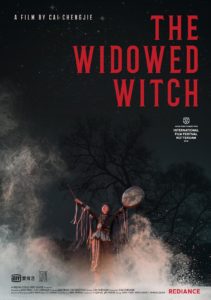Shaman
小寡妇成仙记
China, 2017, b&w/colour, 1.33:1, premiere version: 140 mins., recut version: 115 mins.
Director: Cai Chengjie 蔡成杰.
Rating: 4/10.
Rural black comedy is undermined by alienating, arty direction and a thinly developed script.
Yibaxia village, Hebei province, northern China, the present day, mid-winter. Still traumatised by the explosion of the fireworks factory run by her and her husband Dayong (Han Jianling), Wang Erhao recuperates at the home of her second aunt (Li Guiling) and her husband Laodoufu (Zhao Shulin) after a couple of weeks in hospital and a spell with a local shaman, Zhang. Dayong, she learns, died in the explosion and she was knocked unconscious. Still mute and in shock, Wang Erhao is raped one day by Laodoufu. Soon afterwards she leaves with Shitou (Wen Xinyu), Dayong’s deaf-mute baby brother, to find somewhere to stay. Dayong was her third husband to die, and the villagers  think she’s cursed. The village head (Wang Fuyou) is sympathetic but says he can’t let her stay with him. She reclaims a van that was loaned by Dayong to the unscrupulous Tunaodai (Li Lianzheng) and temporarily lives in that with Shitou. Onetime fortune-teller Long Siye (Wang Qilin), who’s bed-ridden, says she can stay with him but he’s so smelly that she first gives him a hot bath in an oil drum, going off to get some soap and forgetting to go back. She visits an old classmate, Xu Wei (Yang Shuyou), to see if he has room for her but he first tries to jump her and then has to hide from debt-collectors. Then one night Long Siye visits her and claims she is a fairy with magical powers, as he has been able to walk since his bath. Despite her protests, other villagers also claim the same, so she starts to pretend to be a shaman, despite knowing nothing
think she’s cursed. The village head (Wang Fuyou) is sympathetic but says he can’t let her stay with him. She reclaims a van that was loaned by Dayong to the unscrupulous Tunaodai (Li Lianzheng) and temporarily lives in that with Shitou. Onetime fortune-teller Long Siye (Wang Qilin), who’s bed-ridden, says she can stay with him but he’s so smelly that she first gives him a hot bath in an oil drum, going off to get some soap and forgetting to go back. She visits an old classmate, Xu Wei (Yang Shuyou), to see if he has room for her but he first tries to jump her and then has to hide from debt-collectors. Then one night Long Siye visits her and claims she is a fairy with magical powers, as he has been able to walk since his bath. Despite her protests, other villagers also claim the same, so she starts to pretend to be a shaman, despite knowing nothing  about the rituals.
about the rituals.
REVIEW
The blackly comic tale of an outcast widow who suddenly becomes the toast of her county as a spiritualist, Shaman 小寡妇成仙记 is consistently undermined by self-consciously arty direction and a script that starts going round in circles after the first hour. That’s a pity as, in his first feature, writer-director Cai Chengjie 蔡成杰, 37, shows a keen sense of the ridiculous and a sharp eye for visual composition, as well as having a cast, led by 27-year-old newcomer Tian Tian 田天, that plays authentically rural. But time and again – starting with a pointless and drawn-out opening sequence – Cai seems more intent on alienating his audience than involving them, and on a writing level can’t develop his basic idea beyond the initial stages.
The film is a long cry from Cai’s previous directing credit, 听见凉山 (“Listen to Liangshan”, 2013), a TVD youth musical centred on the Yi minority in Sichuan province that ran for two series. Apart from a handful of colour sequences (for no discernible reason), Shaman is in b&w, strikingly shot by producer/d.p. Jiao Feng 焦峰 and set in a northern Hebei village in snowy mid-winter. The story centres on a young, three-time widow who’s deeply traumatised when her latest husband’s firework factory blows up; finally recovers, only to be raped by a cousin; leaves to find somewhere to live, along with her young brother-in-law (a deaf-mute); and then by accident is hailed as a magical healer by the same dour villagers who previously rejected her (three dead husbands, ergo cursed). Reckoning that if that’s what they want, then she’ll give it to them, she pretends to be a shaman.
Not completely original, but a witty enough take on peasant superstition, the plot stalls around the hour mark, as the young widow bamboozles the villagers with fake rituals and is blessed with good luck in her predictions. But the script doesn’t have a third act: it’s made clear that she’s been forced into the situation, and she kind of uses it as revenge for the way she’s been treated, but the idea isn’t developed in any meaningful way and the second half drags on repetitiously, with a throwaway conclusion. Despite the static visual style (v-e-r-y long takes, fixed camera), there’s plenty of dialogue; but it increasingly means less and less.
The widow’s odyssey to find lodgings in mid-winter becomes a journey for the audience into her own past, meeting friends and relatives from her previous marriages; that journey, however, seems to have no impact on the central character herself – and thus little for a viewer to latch on to emotionally, especially when the directing style is so alienating. At an hour, and more accessibly paced, the film could have worked, but not at almost twice that length.
The tall Tian makes a physically striking heroine but has little chance to convey her character’s feelings or thoughts. As her younger, deaf-mute brother-in-law, Wen Xinyu 温新宇 is also a blank page. Only Yang Shuyou 杨树友 registers much personality, as a randy, onetime schoolmate of the widow. Technical credits are fine. Shooting was around Huangtuliangzi township, Pingquan county, in northeast Hebei province, northern China. The film’s plot is all in the Chinese title, which means “The Tale of How a Little Widow Became a Goddess [or, Fairy]”.
[The film premiered at the First Film Festival in Jul 2017 in a version running approximately 140 mins. It was subsequently recut (and given a new English title, The Widowed Witch). This version was first shown at the Rotterdam Film Festival, in competition, on 29 Jan 2018. The above review is of that shorter version. For release in China, the film’s title was changed to 北方一片苍茫 (literally, “A Boundless Stretch in the North”).]
CREDITS
Presented by Beijing Coloured Glaze Film & TV Planning (CN).
Script: Cai Chengjie. Photography: Jiao Feng. Editing: Li Cheng. Music: Jin Weiye, Li Qiang. Art direction: Li Zhengzong, Hu Xiaotao. Costumes: Wang Qi. Sound: Ren Yiming, Wang Xiaoming.
Cast: Tian Tian (Wang Erhao), Han Jianling (Dayong), Zhao Shulin (Laodoufu, second aunt’s husband), Li Guiling (second aunt), Guo Fenghe (Xiaobandeng/Little Stool, second aunt’s son), Wen Xinyu (Shitou/Stone), Wang Fuyou (village head), Fu Bingli (woman throwing water away), Feng Shuyan (Dalajiao), Song Yang, Liu Xing (boys with gun), Wang Qilin (Long Siye/fourth grandfather), Li Lianzheng (Tu’naodai, villager with stall), Yang Shuyou (Xu Wei), Gao Pengcheng (Baocheng), Chen Suli (Baocheng’s wife), Xu Xinrui (Zhaodi, Baocheng’s daughter), Jiao Feng (Dabingzi), Chen Shaofeng (Facai), Cai Rang (Xiaohuli/Little Fox), Li Wenfu (Laolvpi), Zhao Hanfu (third uncle), Gao Yajing (Ruirui, young missing girl), Zhang Yushan (blacksmith), Guo Guiqin (blacksmith’s wife), Xi Ziping (human trafficker), Li Guanghui (motorcycle man), Xue Rongju (fourth uncle), Liu Zhigang (Dapao).
Premiere: First Film Festival (Debut Spotlight), Xining, China, 23 Jul 2017.
Release: China, 20 Jul 2018.
